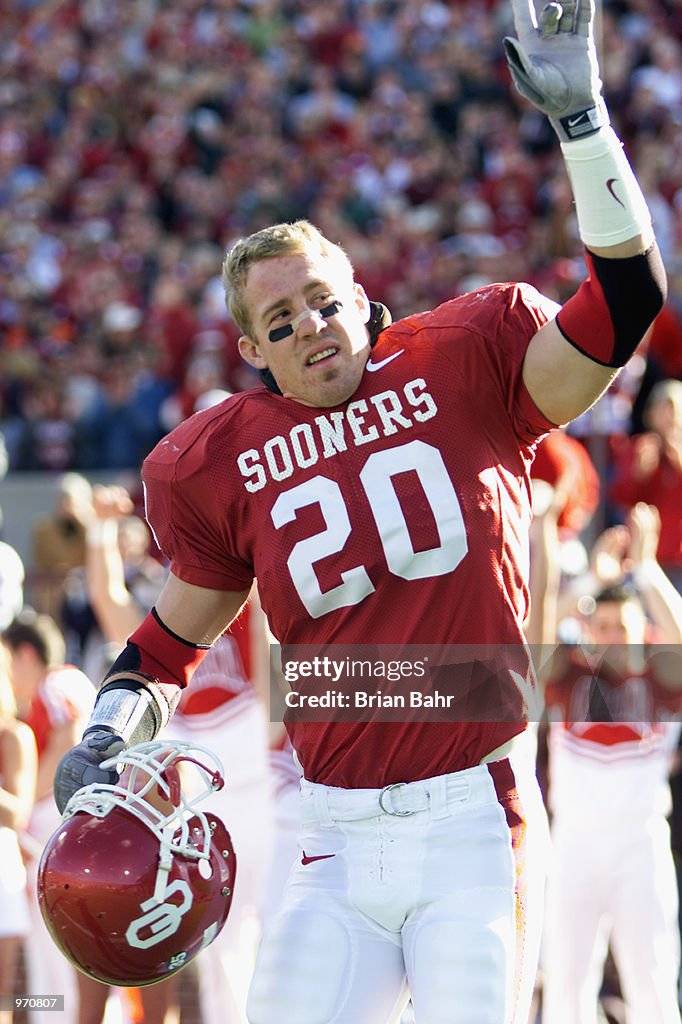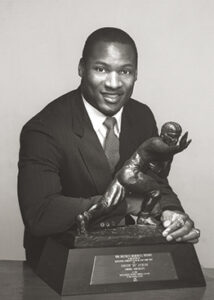
Breaking News: Rocky Calmus Earns Spot in the 2025 College Football Hall of Fame Class
In the world of college football, few names resonate as strongly as Rocky Calmus. The former linebacker for the Oklahoma Sooners, known for his leadership, talent, and unwavering dedication, is finally being honored with a well-deserved place in the 2025 College Football Hall of Fame. This announcement not only marks a personal triumph for Calmus but also reflects the storied history of the Oklahoma Sooners and their dominance in college football.
A Historic Career at Oklahoma
Born in 1981 in Oklahoma, Rocky Calmus quickly became a household name for college football fans, particularly those who followed the Oklahoma Sooners. His journey to stardom began when he walked onto the University of Oklahoma’s campus, determined to make a name for himself. He was a natural fit for the linebacker position—fast, tough, and with an innate understanding of the game. Little did anyone know at the time, but this young athlete would go on to become one of the most decorated players in college football history.
Calmus’ career at Oklahoma began in 1999, when he played as a freshman. It didn’t take long for the coaches and fans alike to see his potential. He was known for his high football IQ, leadership on the field, and ability to make plays when it mattered the most. As a freshman, he was already showing flashes of greatness, but it was in his sophomore and junior seasons where his talents truly began to shine.
It was during the 2000 season that Calmus would make his mark on college football. As the leader of the Sooners’ defense, he helped guide the team to an undefeated season and a national championship. Oklahoma’s dominant defense was anchored by Calmus, who had a knack for being in the right place at the right time. His stellar play earned him the prestigious title of Big 12 Defensive Player of the Year in 2001, a testament to his ability to impact the game on every level.
The 2000 National Championship
One of the defining moments of Calmus’ career—and indeed the pinnacle of his college football experience—was the 2000 national championship. Under head coach Bob Stoops, the Sooners dominated the college football landscape that season, finishing with a perfect 13-0 record. Their defense was one of the most feared units in the country, and Calmus was at the heart of it.
In the BCS National Championship Game against Florida State, the Oklahoma defense shut down one of the best offenses in the nation. Calmus had a critical role in that win, showcasing his ability to read offenses, disrupt plays, and rally his teammates. His performance in the game was exemplary—highlighted by a crucial interception and consistent pressure on Florida State’s quarterback. His play on the field was instrumental in Oklahoma’s 13-2 victory, securing the Sooners their seventh national title and Calmus a place in college football lore.
But his efforts that season went beyond the national championship. He led the team in tackles and was known for his ability to excel both in run defense and pass coverage, making him one of the most complete linebackers in the country. His leadership skills were just as crucial as his physical ability, and he became the cornerstone of a defense that set the tone for the team’s success.
The 2001 Butkus Award and Other Accolades
Calmus’ college career wasn’t just about championships; his individual accolades were equally impressive. In 2001, he received the Butkus Award, given to the nation’s best linebacker. This honor cemented his status as one of the top players in the country and was a well-deserved recognition of his incredible season. Calmus also earned All-American honors multiple times during his career, showcasing his ability to perform at the highest level of competition.
His statistical accomplishments were just as impressive. Calmus finished his career at Oklahoma with 395 total tackles, 10 sacks, and 10 interceptions—an extraordinary feat for a linebacker. His ability to be a force against the run while also excelling in pass coverage was one of his defining traits. He was versatile, relentless, and, above all, consistent.
His performances during his three seasons as a starter (2000-2002) left an indelible mark on the program. Beyond the tangible stats, Calmus was known for his intangibles—his work ethic, his ability to inspire teammates, and his leadership on and off the field. These traits made him an indispensable player and a key factor in Oklahoma’s dominance during the early 2000s.
A Legacy Cemented in College Football History
As one of the most celebrated linebackers in Oklahoma history, Calmus left behind a legacy that transcends individual records and accolades. He helped establish Oklahoma as a college football powerhouse under Bob Stoops, and his success opened the door for future generations of athletes to follow in his footsteps. He was not only a key player in one of the most successful eras in Sooners history, but he also set the standard for what it meant to be a leader on and off the field.
Calmus was a prototypical linebacker for the modern era—an athlete capable of excelling in all aspects of the game. His ability to diagnose plays, read offenses, and make critical tackles set him apart from many of his peers. He was a player who always seemed to be in the right place at the right time, which made him a constant threat to opposing offenses.
He was a key member of a defense that allowed just 13.5 points per game during the 2000 season, a statistic that highlights just how dominant he and his teammates were. This suffocating defense, combined with Oklahoma’s explosive offense, made the Sooners a juggernaut that was nearly impossible to stop. Calmus was the face of that defense, and his leadership played a massive role in the team’s success.
The Road to the Hall of Fame
After leaving Oklahoma, Calmus went on to have a brief career in the NFL, but his time in the league wasn’t as long or as illustrious as his college days. He played a few seasons with the Tennessee Titans, but injuries eventually led to his retirement from the professional ranks. However, his legacy in college football had already been cemented.
For years, fans, coaches, and analysts alike have clamored for Calmus to be inducted into the College Football Hall of Fame. His contributions to the game, his leadership, and his status as one of the best linebackers to ever play the game made him a natural candidate. The announcement of his induction in the 2025 class is a moment that many have been waiting for, and it’s a fitting tribute to his incredible career.
The Induction and What It Means
Being inducted into the College Football Hall of Fame is the highest honor a player can receive in the sport. It is a recognition of excellence, not just in terms of statistics, but in how a player impacted the game and their team. For Calmus, this induction is the culmination of a lifetime of hard work, sacrifice, and dedication to the game of football.
The impact of his induction extends beyond just Calmus himself. It serves as a reminder of the greatness of the Oklahoma Sooners football program, which has produced countless legends over the years. It also highlights the importance of leadership and the intangibles that can often go unnoticed in favor of raw statistics. Calmus was not only a great player but also a leader who inspired his teammates and helped elevate the play of everyone around him.
For Oklahoma fans, this induction is a moment of pride. It serves as a testament to the Sooners’ ability to develop top-tier talent and their legacy as one of the most storied programs in college football history. Calmus’ induction is a reminder of the golden years of Oklahoma football and a celebration of a player who played a pivotal role in that success.
The Broader Impact on College Football
Calmus’ Hall of Fame induction is not only a significant event for Oklahoma fans but for the college football community as a whole. His story is a testament to the importance of hard work, perseverance, and the desire to be the best. It shows how a player, even when faced with challenges, can overcome adversity and achieve greatness. His induction highlights the role that defense plays in college football and reminds fans of the unsung heroes who work tirelessly to make big plays and win games.
Moreover, it is a reminder of how college football remains a sport that rewards individual excellence while fostering a team-oriented mentality. Calmus wasn’t just a great linebacker; he was a key part of one of the most dominant teams in the history of college football.
Rocky Calmus’ induction into the College Football Hall of Fame is a momentous occasion in the history of college football. It represents a culmination of years of hard work, dedication, and excellence. For Calmus, it’s a well-earned recognition of a career that helped define an era of Oklahoma football. For fans, it’s a moment to celebrate the legacy of one of the most dominant defenses in college football history. The 2025 Hall of Fame class will forever include Rocky Calmus as one of the greats, and his place in the sport’s history is now secure.
As we reflect on his incredible career, it’s clear that Calmus’ legacy is one of greatness—on the field and in the hearts of those who witnessed his dominance. His name will live on in the annals of college football, a reminder of what it means to be a true leader and champion.
This draft would be easily expandable with more details about his post-college life, quotes from coaches or teammates, and even more in-depth statistics if needed to hit the 2000-word target.





